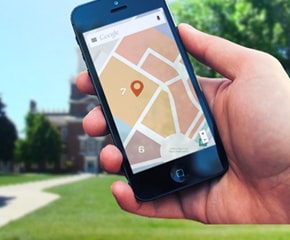
Wabash Railroad Travel Literature Collection
Brochures, tickets, flyers, maps, timetables and other Wabash Railroad related material originally housed in a scrapbook.
Biographical / Historical Note
The basic template for the Wabash Railroad system was laid out in the 19th century, with a continual series of mergers, reorganizations, and changed names (typical of the growth of railroad systems). Highlights include:
-1838: The nucleus of...
MoreThe basic template for the Wabash Railroad system was laid out in the 19th century, with a continual series of mergers, reorganizations, and changed names (typical of the growth of railroad systems). Highlights include:
-1838: The nucleus of what became the Wabash system started as the Northern Cross Railway (the first railroad in Illinois), a 12-mile line running from Jacksonville to Meredosia in west central Illinois.
-1856: Renamed the Toledo, Wabash and Western Railway Company, the system now covered a 520-mile stretch from Toledo, Ohio, through Indiana to the western border of Illinois (Quincy) and northwest to Keokuk, Iowa. The Wabash line was named for the Wabash River, a 475-mile river running through northwest Ohio, northern Indiana, and Illinois.
-1881: Through the vision of railroad baron Jay Gould, this system, now called the Wabash Railway Company, reached Detroit and Chicago and extended into Missouri via St. Louis. But it never developed into the complete "shore-to-shore" system that Gould had envisioned. Instead, it became the principle artery tapping the great "Heart of America."
-By 1900: The Wabash system extended as far as Kansas City, Missouri; Des Moines, Iowa; Omaha, Nebraska; and Buffalo, New York. Connections could be made from various hubs to the east and west coast via other lines.
The Wabash Railroad was a strong Midwestern carrier. Even during downturns of the 20th century, when many similar sized railroads went bankrupt or were folded into larger systems, the Wabash remained a strong and popular passenger line until Amtrak took over the national railroad system in 1971. It continued its name as a freight carrier until 1991 when it was folded into the Norfolk Southern system.
LessScope and Content Note
The collection is comprised of brochures, tickets, destination flyers, route maps, timetables, advertisements, ticket prices, station locations, special event destinations, railroad station signage, executive biographies, railroad lithographs, and other...
MoreThe collection is comprised of brochures, tickets, destination flyers, route maps, timetables, advertisements, ticket prices, station locations, special event destinations, railroad station signage, executive biographies, railroad lithographs, and other pieces of railroad related material. The acquisition was acquired in a scrapbook form. It was saved from a dumpster by a vice president of the Railroad. Because the scrapbook was in poor condition, the contents were removed and individual files created following the original organization.
LessCollection Details
Object ID: 2012.67.0
Inclusive Dates: 1906-1959
Size: 0.9 cubic ft. and 1 oversize box
Language: English
Collection Access & Use
Item Location: Not Currently On Exhibit
Access Restrictions: The collection is open for research.
Credit: From the Collections of The Henry Ford. Gift in Memory of John A. Barrett.
Digitized Artifacts From This Collection
In many cases, not all artifacts have been digitized.
Contact us for more information about this collection.


Special Low Excursion Rates and Double Daily Train Service to Colorado, Utah, California, Oregon, Washington, and Yellowstone National Park, 1911
 Details
Details
Special Low Excursion Rates and Double Daily Train Service to Colorado, Utah, California, Oregon, Washington, and Yellowstone National Park, 1911
Artifact
Timetable
Date Made
1911
Summary
The Wabash Railway, with origins dating back to 1838, was a strong Midwestern carrier until Amtrak took over the national passenger railroad system in 1971. Railroads made Yellowstone National Park accessible to tourists until cross-country automobile travel became feasible and popular. This timetable promoted Wabash's through trains to Yellowstone, operated in partnership with Union Pacific.
Object ID
2012.67.23
Credit
From the Collections of The Henry Ford. Gift in Memory of John A. Barrett.
Location
By Request in the Benson Ford Research Center
Get more details in Digital Collections at:
Special Low Excursion Rates and Double Daily Train Service to Colorado, Utah, California, Oregon, Washington, and Yellowstone National Park, 1911
What is The Henry Ford?
The national attraction for discovering your ingenuity while exploring America’s spirit of innovation. There is always much to see and do at The Henry Ford.


Wabash Round Trip Homeseekers' Fares to the West and Southwest, On Sale Every First and Third Friday of Each Month, 1910, Via Wabash R.R.
 Details
Details
Wabash Round Trip Homeseekers' Fares to the West and Southwest, On Sale Every First and Third Friday of Each Month, 1910, Via Wabash R.R.
Artifact
Price list
Date Made
1910
Summary
The Wabash Railway, with origins dating back to 1838, was a strong Midwestern carrier until Amtrak took over the national passenger railroad system in 1971. This timetable promoted Wabash's service to Kansas City. Special "homeseekers" or "colonist" fares provided low-cost, one-way service for immigrants traveling to start new lives in the western United States.
Creators
Keywords
Object ID
2012.67.20
Credit
From the Collections of The Henry Ford. Gift in Memory of John A. Barrett.
Location
By Request in the Benson Ford Research Center
Get more details in Digital Collections at:
Wabash Round Trip Homeseekers' Fares to the West and Southwest, On Sale Every First and Third Friday of Each Month, 1910, Via Wabash R.R.
What is The Henry Ford?
The national attraction for discovering your ingenuity while exploring America’s spirit of innovation. There is always much to see and do at The Henry Ford.
Seed Corn Week!, 1912
Artifact
Poster
Date Made
1912
Summary
The Wabash Railway, with origins dating back to 1838, was a strong Midwestern carrier until Amtrak took over the national passenger railroad system in 1971. Like other railroads, Wabash advertised its trains to people relocating to the American West. Wabash promoted the fertile farmland along its routes, and it offered special fares and services for farmers.
Creators
Keywords
Object ID
2012.67.19
Credit
From the Collections of The Henry Ford. Gift in Memory of John A. Barrett.
Location
By Request in the Benson Ford Research Center
Get more details in Digital Collections at:
Seed Corn Week!, 1912
What is The Henry Ford?
The national attraction for discovering your ingenuity while exploring America’s spirit of innovation. There is always much to see and do at The Henry Ford.
Brochure and Timetable for Wabash Railway Company, "Going Away?," 1924
Artifact
Brochure
Date Made
1924
Summary
The Wabash Railway, with origins dating back to 1838, was a strong Midwestern carrier until Amtrak took over the national passenger railroad system in 1971. This brochure promised that the company's new all-steel cars were safer than the hazardous old wooden railroad cars. Furthermore, unlike automobile travel, railroad passengers were completely taken care of here by conductors, porters, and waiters.
Creators
Keywords
Object ID
2012.67.1
Credit
From the Collections of The Henry Ford. Gift in Memory of John A. Barrett.
Location
By Request in the Benson Ford Research Center
Get more details in Digital Collections at:
Brochure and Timetable for Wabash Railway Company, "Going Away?," 1924
What is The Henry Ford?
The national attraction for discovering your ingenuity while exploring America’s spirit of innovation. There is always much to see and do at The Henry Ford.


Handbill and Timetable for Wabash Railway's "Midnight Limited," Leaving from Delmar Avenue Station, St. Louis, Missouri, 1929
 Details
Details
Handbill and Timetable for Wabash Railway's "Midnight Limited," Leaving from Delmar Avenue Station, St. Louis, Missouri, 1929
Artifact
Brochure
Date Made
1929
Summary
The Wabash Railway, with origins dating back to 1838, was a strong Midwestern carrier until Amtrak took over the national passenger railroad system in 1971. In 1928, the Wabash Railway erected the Delmar Avenue Station, providing west-end and suburban St. Louis residents -- particularly businessmen -- convenient access to their railroad system without having to go all the way downtown.
Creators
Place of Creation
Keywords
Object ID
2012.67.3
Credit
From the Collections of The Henry Ford. Gift in Memory of John A. Barrett.
Location
By Request in the Benson Ford Research Center
Get more details in Digital Collections at:
Handbill and Timetable for Wabash Railway's "Midnight Limited," Leaving from Delmar Avenue Station, St. Louis, Missouri, 1929
What is The Henry Ford?
The national attraction for discovering your ingenuity while exploring America’s spirit of innovation. There is always much to see and do at The Henry Ford.


Daily Through Sleepers between Chicago and the Health and Pleasure Resorts of the Southwest, 1915
 Details
Details
Daily Through Sleepers between Chicago and the Health and Pleasure Resorts of the Southwest, 1915
Artifact
Timetable
Date Made
1915
Summary
The Wabash Railway, with origins dating back to 1838, was a strong Midwestern carrier until Amtrak took over the national passenger railroad system in 1971. This timetable advertised Wabash's through trains between Chicago and resort communities in Arkansas and Texas. Wabash operated the service in cooperation with the St. Louis, Iron Mountain & Southern Railway and the International & Great Northern Railway.
Creators
Keywords
United States, Illinois, Chicago
United States, Arkansas, Hot Springs
United States, Arkansas, Little Rock
United States, Texas, Fort Worth
United States, Texas, Mineral Wells
United States, Texas, San Antonio
Object ID
2012.67.18
Credit
From the Collections of The Henry Ford. Gift in Memory of John A. Barrett.
Location
By Request in the Benson Ford Research Center
Get more details in Digital Collections at:
Daily Through Sleepers between Chicago and the Health and Pleasure Resorts of the Southwest, 1915
What is The Henry Ford?
The national attraction for discovering your ingenuity while exploring America’s spirit of innovation. There is always much to see and do at The Henry Ford.


Shortest Line, Fastest Time to Colorado and the West and Northwest - The St. Louis Colorado Limited, 1913
 Details
Details
Shortest Line, Fastest Time to Colorado and the West and Northwest - The St. Louis Colorado Limited, 1913
Artifact
Broadside (Notice)
Date Made
1913
Summary
The Wabash Railway, with origins dating back to 1838, was a strong Midwestern carrier until Amtrak took over the national passenger railroad system in 1971. Railroads made Yellowstone National Park accessible to tourists until cross-country automobile travel became feasible and popular. This timetable promoted Wabash's through trains to Yellowstone, operated in partnership with Union Pacific.
Keywords
United States, California, Los Angeles
United States, California, San Francisco
United States, Colorado, Denver
United States, Missouri, St. Louis
United States, Oregon, Portland
United States, Utah, Salt Lake City
United States. Yellowstone National Park
Object ID
2012.67.21
Credit
From the Collections of The Henry Ford. Gift in Memory of John A. Barrett.
Location
By Request in the Benson Ford Research Center
Get more details in Digital Collections at:
Shortest Line, Fastest Time to Colorado and the West and Northwest - The St. Louis Colorado Limited, 1913
What is The Henry Ford?
The national attraction for discovering your ingenuity while exploring America’s spirit of innovation. There is always much to see and do at The Henry Ford.
Wabash-Union Pacific Low Colonist Fares Every Day from March 15 to April 15, 1913 Inclusive
Artifact
Timetable
Date Made
1913
Summary
The Wabash Railway, with origins dating back to 1838, was a strong Midwestern carrier until Amtrak took over the national passenger railroad system in 1971. This timetable advertised Wabash's passenger trains to the western United States, operated jointly with Union Pacific. Low-cost "colonist" fares were offered to attract immigrant travelers heading west to start new lives.
Keywords
United States, Missouri, St. Louis
United States, Nebraska, Omaha
Object ID
2012.67.22
Credit
From the Collections of The Henry Ford. Gift in Memory of John A. Barrett.
Location
By Request in the Benson Ford Research Center
Get more details in Digital Collections at:
Wabash-Union Pacific Low Colonist Fares Every Day from March 15 to April 15, 1913 Inclusive
What is The Henry Ford?
The national attraction for discovering your ingenuity while exploring America’s spirit of innovation. There is always much to see and do at The Henry Ford.



Brochure for Wabash Railway's Excursions, "See Niagara Falls, America's Greatest Wonder," 1929
 Details
Details
Brochure for Wabash Railway's Excursions, "See Niagara Falls, America's Greatest Wonder," 1929
Artifact
Brochure
Date Made
1929
Summary
The Wabash Railway, with origins dating back to 1838, was a strong Midwestern carrier until Amtrak took over the national passenger railroad system in 1971. Niagara Falls was one of America's earliest and most popular tourist attractions. To compete with automobiles, the Wabash Railway offered in this 1929 brochure convenient excursion trips with economical fares to this popular attraction.
Creators
Place of Creation
Object ID
2012.67.5
Credit
From the Collections of The Henry Ford. Gift in Memory of John A. Barrett.
Location
By Request in the Benson Ford Research Center
Get more details in Digital Collections at:
Brochure for Wabash Railway's Excursions, "See Niagara Falls, America's Greatest Wonder," 1929
What is The Henry Ford?
The national attraction for discovering your ingenuity while exploring America’s spirit of innovation. There is always much to see and do at The Henry Ford.









